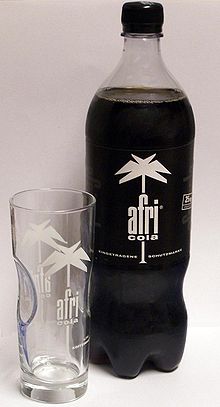– **History:**
– Registered in 1931 by F. Blumhoffer Nachfolger GmbH.
– Karl Flach developed a German equivalent to Coca-Cola in 1932.
– Became popular post-World War II in Germany.
– Launched Bluna, an orange soft drink, in 1952.
– Market share declined in the 1960s due to competition.
– **Availability outside Germany:**
– Real Soda LLC imported Afri Cola to the US in the mid-1990s.
– Marketed as having the highest caffeine content allowed by law.
– Exported to Austria, France, Saudi Arabia, Switzerland, and Czech Republic.
– Relaunched in the US in May 2017 on the West Coast and New York.
– Sold in a 330ml version of the iconic Afri Cola glass bottle.
– **In literature:**
– Featured prominently in Volker Kutschers 2014 detective novel Märzgefallene.
– Set in 1933 Berlin and Cologne.
– English translation published in 2020 as The March Fallen.
– **See also:**
– Premium-Cola based on the original Afri Cola recipe.
– **References:**
– Made in Cologne: (Fast) alles, was Köln bekannt macht.
– Warum sollen Nonnen nicht Afri Cola trinken? – WELT.
– The Coca-Cola Company Under the Nazis.
– The World of Caffeine: The Science and Culture of the World’s Most Popular Drug.
– No Coke, only German Afri Cola at G8 summit.
Afri Cola is a cola soft drink produced in Germany. The trademark Afri-Cola was registered in 1931 by the company F. Blumhoffer Nachfolger GmbH. The same company also produced Bluna, an orange soft drink. Today the brand belongs to the Mineralbrunnen Überkingen-Teinach AG. Afri Cola was once one of the most popular cola brands in Germany, but has lost considerable market share since the 1960s.
 1 liter plastic Afri-Cola bottle, alongside a 0.2-liter bar glass | |
| Type | Cola |
|---|---|
| Manufacturer | Mineralbrunnen Überkingen-Teinach AG |
| Country of origin | Germany |
| Introduced | 1931 |
| Related products | Bluna |
| Website | https://afri.de/ |

